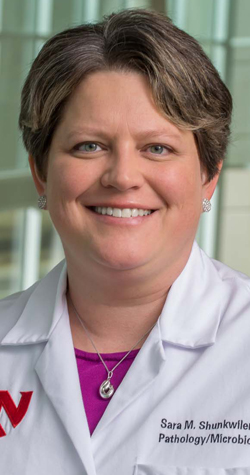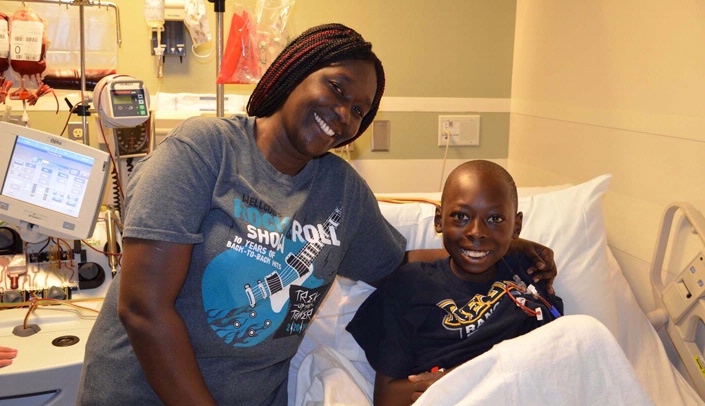A patient’s story
Eleven-year-old Martin Mwita, of Omaha, has made more than 300 visits to health care facilities since he was a baby. Because of sickle cell disease, he’s suffered three strokes and countless other health episodes.
Jacinta Mwita, Martin’s mother, said the therapy improves the quality of the family’s life.
“The difference in his health since changing from transfusion to red blood exchange is incredible,” said Jacinta Mwita, a single mom who works full time. “The best they could get his sickled red cells down to before was to 50 percent. Now it’s 5 percent.
“The longer intervals in between treatment will be one of the biggest benefits of finding more life balance, so we don’t have to take much time away from everything else, especially school. It’s not just him, it’s everyone,” Jacinta said.
She is thankful to the blood donors who have improved not only Martin’s quality of life, but his family’s too. Though the family doesn’t know the identity of the donors who live in various states, the Red Cross contacts 20 who donate blood specifically to Martin because their blood matches Martin’s at a more complex level than just blood type.
“Isn’t that amazing? It’s incredible that someone we don’t even know would do this. I would love to meet them and say ‘thank you,'” she said. “I thank the staff and particularly those in the Lied Transplant Center. The nurses are incredible and the doctors care. Martin has practically grown up at the unit and they all know him by name.”
A therapy now available through Nebraska Medicine and UNMC will significantly reduce the risk of stroke for children with severe sickle cell disease.
The medical center recently began offering the state’s first pediatric chronic red cell blood exchange in conjunction with the American Red Cross.
Sickle cell disease can lead to many complications including stroke, chronic leg ulcers, frequent pain crises and blood clots. It can result in an increased susceptibility to infection. About 1 in 600 African-Americans has sickle cell disease.
Those who could benefit from the therapy are children and adults with a history of stroke or those whose imaging tests show a high risk of stroke. Newborns are screened for sickle cell disease and those found with the disease are screened yearly for potential strokes beginning at two years of age.
Physicians involved in the new service are Sara Shunkwiler, M.D., Scott Koepsell, M.D., Ph.D., and James Harper, M.D.
“Red cell exchange is not only an iron neutral procedure, it also can more quickly and more efficiently decrease the percentage of a patient’s red blood cells that are sickled,” said Dr. Shunkwiler, assistant professor, UNMC Department of Pathology and Microbiology and medical director of Blood Bank and Tissue Services at Nebraska Medicine. “This is the first time that chronic red cell exchanges for pediatric patients have been performed in this area.”
For sickle cell patients who have already had a stroke, frequent blood transfusions (chronic transfusion therapy) can decrease their risk of having a second stroke by as much as 90 percent. However, frequent transfusions can lead to a buildup of iron in the body which can lead to organ damage and eventually organ failure.
 |
Sara Shunkwiler, M.D. |
Patients typically have red blood exchanges every three to four weeks that usually takes two to three hours.
This is in contrast to chronic transfusion therapy which is required as frequently as every other week, takes most of a day to complete and can cause scar tissue, making it difficult to get and maintain good vein access.
Dr. Shunkwiler collaborates with Dr. Harper to identify children who need the service. Dr. Harper is a UNMC associate professor and pediatric hematologist/oncologist at Nebraska Medicine and Children’s Hospital & Medical Center.

Absolutely amazing! So happy for this little boy whose quality of life is improving as advances in treatment are made.
Those smiles on the faces of the mother and her son say it all! Congrats to all who made this happen!